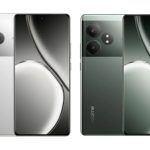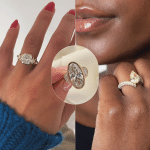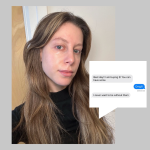Welcome to the wonderful world of tweakments! It wouldn’t be an overstatement to say that aesthetic treatments are the next frontier of the beauty industry, an evolution of the professional skin treatments we’ve been having for years, and an innovation of technology that allows us to achieve results that go above and beyond the capabilities of our daily skincare routines. “Tweakments are non-surgical cosmetic procedures, like fillers, Botox, laser treatments, or skin peels, that can make small but significant changes to the face or the body,” explains Alice Hart-Davis, beauty journalist and founder of The Tweakments Guide. “Things like softening wrinkle lines, improving skin texture, replacing lost volume, and tightening the skin.”
A few decades ago, tweakments were the preserve of the rich and famous, and those who had committed to cosmetic procedures rarely opened up about their experiences. Fast-forward to 2023, and cosmetic procedures are big business, interest in tweakment trends are at an all-time high, and getting lip filler has become almost as easy as getting a haircut. “As more non-surgical treatments were developed, and more practitioners began offering them, more people realized that here were a heap of procedures that could fill in the yawning gap between having expensive, invasive cosmetic surgery and doing nothing, and their popularity snowballed,” says Hart-Davis. “Now, tweakments are more about beautification rather than anti-aging, and they are massively popular with younger generations, too.”
Of course, there’s still a lot of stigma about cosmetic procedures, which ultimately comes from a lack of information as well as non-existent regulation within the aesthetics industry. “The industry is disastrously unregulated, so thousands and thousands of people who fancy ‘having a go’ have piled into it over recent years,” adds Hart-Davis. “Anyone can pick up a needle and start injecting filler perfectly legally without any requirement of a medical background, or specialist training.”
In light of this, it’s incredibly important to do your research before booking in for a tweakment. “There are loads of brilliant practitioners out there, but there are also many more people who should never be allowed to wield a needle,” cautions Hart-Davis. “It’s also a sector where ‘cheap’ is never ‘good.’ What you’re paying for is the expertise of a great practitioner who uses good-quality products. It’s the practitioner who is key to a successful outcome, whatever product or device they’re using.” Once you’ve found a few potential practitioners, book in for a consultation with each of them to be sure that they (and their treatment) are right for you. “Avoid practitioners who pressure you, who don’t share their credentials willingly, and who don’t answer your questions directly,” advises freelance beauty editor Nateisha Scott. “Also, I would recommend reading up on the tweakment you want for your skin tone, as it’s important you work with a practitioner who has experience with a range of skin tones.”
It’s true that more and more of us are going under the needle than ever before, but it is also worth us acknowledging that no one ever needs tweakments. It is an entirely personal choice, and this article isn’t here to sway you into thinking that you need any and all forms of tweakments going. We do, however, want to arm you with everything you need to know about said tweatments, as well as suggest where to go if you’ve decided to try something out. So to help you kick off your research, we’ve compiled the ultimate guide to the most popular tweakments, from micro-needling to Botox and everything in between.
Fillers are probably one of the most well-known cosmetic treatments. They’ve been around for decades but have spiked in popularity in the last few years thanks to celebrities like Kylie Jenner and Chrissy Teigen speaking candidly about their experiences with filler. “Dermal fillers are gel-like substances that are injected into the skin to help plump, smooth lines, enhance facial features, restore lost volume, and rejuvenate,” explains cosmetic dentist and advanced facial aesthetician Tara Francis. “They can effectively give a fresher appearance to the face, mask bumps in the nose, define jaw lines, plump lips, or give defined cheekbones, amongst other things.”
As opposed to cosmetic surgery, filler is a more flexible alternative since its results won’t last forever, and it can easily be reversed, should complications arise. “Not everyone wants to go through surgery to achieve certain results for various reasons, including cost, downtime, uncertainty of results, and its irreversible nature, so dermal fillers are an alternative option for many people,” says Francis. “Depending on the area, a dermal filler appointment can take no more than 30 to 60 minutes with pretty much no downtime.”
As for the results, dermal filler can be applied in a number of areas, and according to Francis, depending on the area treated, results can vary from fuller lips, less hollow under-eyes, rejuvenated mid-face, more refined facial contours, a more balanced profile, and revitalized skin. “You can expect to see results immediately, but full, settled results can take up to two weeks,” she adds.
As the procedure is not without its risks and so should not be taken lightly, Francis says the most important thing to do is go to someone who holds a medical qualification. “A medical professional should be able to manage any potential emergency complications,” she says. “Plus, they can prescribe any necessary medications, alongside having an ethical responsibility being part of a governing body in their field.”
Most people have heard of Botox, but what most people don’t know is that while Botox has become the catchall term, it’s actually a brand, not a treatment. The actual treatment itself is known as a neuromodulation. “Essentially, it’s a temporary, noninvasive treatment commonly used to treat fine lines and wrinkles as well as other concerns,” explains Usman Qureshi, a cosmetic physician and aesthetic doctor. “It is injected into the muscles, blocking chemical signals that cause the muscle to contract, and relaxing the muscles that tend to cause fine lines, wrinkles, and tension.”
The most well-documented reason for getting Botox is to remove or prevent fine lines and wrinkles. However, Qureshi adds that it’s a diverse treatment that can also be used to release tension in certain muscles, prevent migraines and tension headaches, and even treat sweating or overactive bladders. “Most commonly, Botox is used on the face, and the results show smoother skin with reduced appearance of fine lines or wrinkles,” he says. “But Botox can be used to target specific problem areas for each patient such as crow’s-feet or forehead lines.”
The great thing about Botox (and probably the main reason for its popularity) is that it can be used to treat existing lines and wrinkles as well as to prevent future ones. “For example, if you are in your 20s and get a ‘baby Botox’ treatment, this will work as a preventative to developing fine lines and wrinkles,” Qureshi explains. “And if you are in your 40s and have already developed wrinkles, Botox will soften the appearance of these lines.”
Another reason for Botox’s popularity is that it’s a relatively low-risk treatment. According to Qureshi, side effects are often minor but can include bruising around the injection area, asymmetrical results, pain, swelling, headache, or flu-like symptoms. This is providing of course that you seek a medically trained professional. “I had Botox for the first time earlier this year around my eyes, brows, and forehead to open up my hooded eyes slightly,” says Who What Wear beauty editor Eleanor Vousden. “I would advise researching your clinics and practitioners beforehand, checking their qualifications and credentials, and reading their reviews. It’s so important to visit someone who is qualified to treat you, and know the necessary protocols if things do go wrong.”
You may be more familiar with laser devices being used in hair removal treatments, but laser technology is also extremely popular within cosmetic dermatology. “The laser creates beams of thermal energy which penetrate deep into the skin,” explains dermatologist Elif Benar. “The laser beams vaporize damaged skin and, by stimulating your body’s natural healing process, encourage collagen production and cell regeneration to reveal glowing renewed skin.”
Because of the way it works, laser can be an effective treatment for a number of skin concerns, including acne scarring, wrinkles, pigmentation, and redness. “You will look fresher and plumper and have a more even skin tone, and it can also reduce the appearance of fine lines and wrinkles,” adds dermatologist Salomé Dharamshi. “However, it unfortunately isn’t suitable for all skin types, especially if you are experiencing an acne breakout, have sagging skin, or have very dark skin.”
Micro-needling is another treatment you may already be familiar with since it’s often incorporated into a facial treatment, but according to Angela Taylor, education director at Dermalogica, it’s now one of the most requested tweakments globally. “Micro-needling uses skin needling devices to perforate the skin creating thousands of pin-prick, micro injuries that trigger a controlled inflammatory reaction,” she explains. “This inflammatory response initiates natural repair processes that promote skin rejuvenation.”
The skin benefits of micro-needling range from a reduced appearance of lines and wrinkles to faded hyperpigmentation, reduced appearance of pores and scarring, and smoother skin. “Collagen stimulation begins within 48 hours of the treatment and takes at least four weeks for the first sign of results to be seen,” says Taylor. “Results will continue to improve for three to 12 months after the treatment as a new collagen matrix is formed within the skin.”
Micro-needling is an easily accessed treatment, and Taylor says that while it’s generally safe for all skin types, those who are pregnant or have a history of eczema, psoriasis, herpes, diabetes, and other chronic conditions should consult their physician for approval. “Skin priming is also important to ensure the best outcome from your treatment,” she adds. “Well-hydrated and prepped skin with good barrier function means your skin will tolerate the treatment better and reduce the risk of adverse responses.”
If you’re already clued up on tweakments, then you may have already heard of Morpheus8, a skin treatment that builds upon radio frequency and micro-needling technology in order to stimulate collagen production. “Morpheus8 is another one that has got the tweakment-curious chattering ever since it was revealed that this was one of the treatments behind Judy Murray’s 2021 transformation,” says Hart-Davis. “The micro-needling part causes thousands of tiny wounds, which your body races to repair with new collagen, and the radio frequency energy delivered through the needle tips heats up the skin, again, prompting more collagen growth.”
This is far more than just a regular radio frequency or micro-needling treatment. “By targeting the deeper layers of the skin, tissues of the face and body can be ‘remodeled’ for a more radiant youthful appearance,” explains aesthetics nurse provider Dawn Attewell. “The Morpheus8 micro-needles can go deeper than any radio frequency micro-needling device on the market to date.”
The treatment claims to reduce fine lines and wrinkles, improve skin tone and texture, and tighten areas of skin laxity. By restoring lost collagen and elastin, Attewell explains that it can even minimize acne scarring, fade stretch marks and smooth out the skin’s overall texture. “After your treatment, your face will naturally improve its complexion, but it’s important to note that better results will appear three to six months after the appointment,” she adds.
What’s more, the risks associated with Morpheus8 are relatively minimal. “It’s a noninvasive treatment with little downtime,” Attewell explains. “You might feel a moderate sunburn sensation immediately after your treatment, so make sure you apply a broad-spectrum UVA/UVB sunscreen to help protect your skin.”
When it comes to making your skin look fresher and clearer, a facial is probably the first treatment you’d consider booking. But it’s not the only option. In fact, Profhilo has become the popular alternative. “Profhilo has really grabbed people’s imagination,as it makes a huge difference to skin quality, so you get hydrated, smoother more radiant skin without looking any different,” says Hart-Davis. “It’s a branded type of ‘injectable moisturiser,’ a whole category of products made from a kind of runny hyaluronic acid gel, which sits just beneath the surface of the skin.”
Yep, that’s right. The very same ingredient that features in your hydrating serums and moisturizers—but by having it injected into your skin, you’ll potentially see even more impressive results. “Over a number of weeks, patients notice a gradual improvement in the feel and appearance of the skin,” says Dev Patel, medical director at Perfect Skin Solutions. “It stimulates collagen and elastin production in the skin, as well as enhancing hydration, thereby leading to improved tissue quality. So skin becomes firmer and tighter as a result with less lines and wrinkles apparent.”
If you’re not yet convinced by dermal fillers, this can be a great alternative since it bridges the gap between a facial and a more advanced cosmetic procedure. “It is a great treatment for anyone keen to have a holistic improvement on skin integrity with minimal downtime and risk,” says Patel. “Those anxious about the idea of dermal fillers will also find this a better option to consider.” That said, it’s still important to get Profhilo from a medically licensed injector. “Although this is far safer than dermal fillers, no injectable treatment is without risk, and you need to have someone who understands how to assess you medically,” he adds.
A more recent technique and a popular alternative to lip filler, lip-lifts aim to make the upper lip appear fuller but without increasing its volume. “It’s a minimally invasive treatment where Botox is injected in tiny droplets into the facial muscles that surround your lips and the corners of the mouth to relax and ‘flip’ it out,” explains plastic surgeon Alex Rubin. “This treatment is ideal for anyone looking to create natural-looking upper lips and achieve a more pouty look.”
Lip flips usually cost less than lip filler, but the results don’t last quite so long, and they’re not without their own complications. “If done incorrectly, a lip flip treatment can impact the integrity of the lip structure, thus affecting how you talk, smile, and so forth,” says Rubin. “So I would always recommend going to a highly trained medical professional.”
It might not surprise you to discover that tweakments are not just for the face. One of the most popular body tweakments is CoolSculpting, a noninvasive contouring treatment that targets fat in body areas that are more challenging to target via exercise or diet. “It can help you get rid of excess fat from your body without having to undergo a surgical procedure, such as a tummy tuck or liposuction,” says laser and beauty aesthetician Rehab Yahia. “The FDA-approved treatment works by freezing fat cells, killing and breaking them down in the process.”
The results won’t appear immediately, explains Yahia. “When you are treated, the fat cells in the target area are destroyed and your lymphatic system naturally removes the cells from the body,” she explains. “This means that the fat will be removed slowly, so you can expect to see the results one to three months after your treatment.”
With CoolSculpting, there are no anesthesia or cuts involved. However, complications may include localized pain, sensitivity, and bruising. “As the fat cells are being slowly removed from the body, during this time, you might feel soreness or redness in the treated area, but this will subside along with other side effects, should you encounter any,” says Yahia.
This multitasking device combines radio frequency with dynamic muscle activation to stimulate collagen production. It can help to both reduce the appearance of fine lines and wrinkles and improve texture and muscle volume.
This award-winning facial toning device harnesses low-level microcurrent to accelerate collagen production and improve facial contour. Use it consistently, and you’ll see results within weeks.
LED light therapy is often incorporated into professional facial treatments. It has benefits for almost every skin type and concern. This flexible mask allows you to get the benefits from the comfort of your own home. In fact, 95% of users said their skin tone, texture, and firmness improved after use.
Combining hot and cold waves with LED technology and sonic massage, this handy gadget mimics the effects of a professional facial. Pair with your favourite UFO activated mask (sold separately) for a next-level luxury facial experience.
Designed specifically to target fine lines in the eye and lip areas, the NuFace Fix uses microcurrent to lift, plump, tighten, and firm.
Newa’s powerful at-home device uses clinical-grade radio frequency technology to help the skin renew its production of collagen and elastin. You’ll see results in as little as four weeks.
This portable device definitely falls under the “splurge” category, but the effects it provides are well worth it. It incorporates professional-grade low-frequency ultrasound and electro muscle stimulation to activate skin metabolism and stimulates the regeneration of skin cells. It stimulates collagen production, tightens the skin, and increases oxygen to the cells to increase waste removal.
Up Next: I Got Lip Filler for the First Time—Here’s Everything You Need to Know
This post originally appeared on Who What Wear UK.







